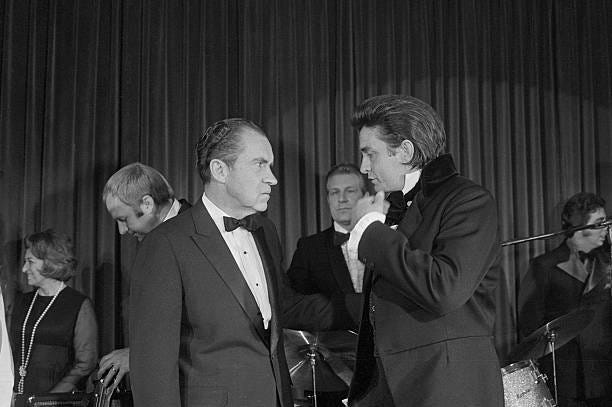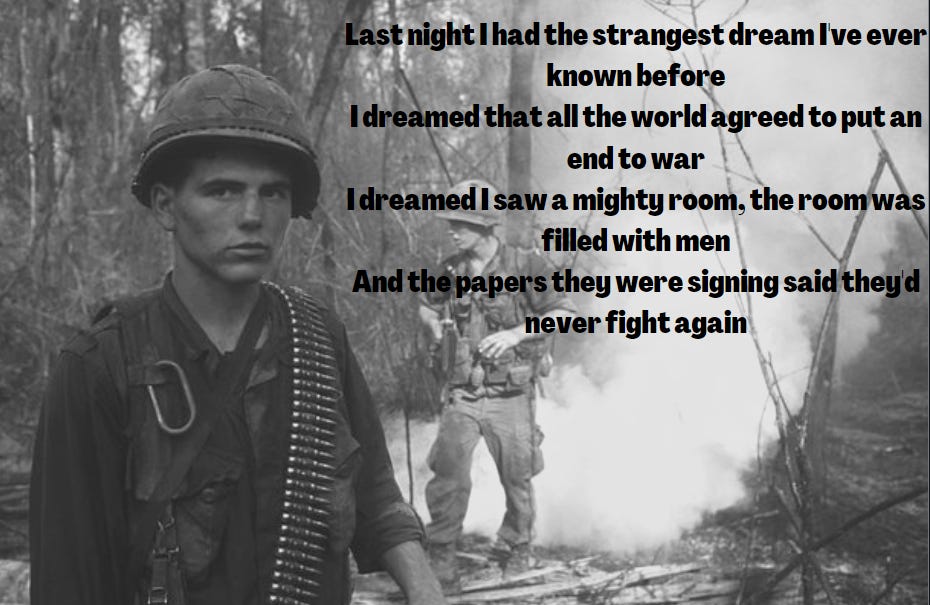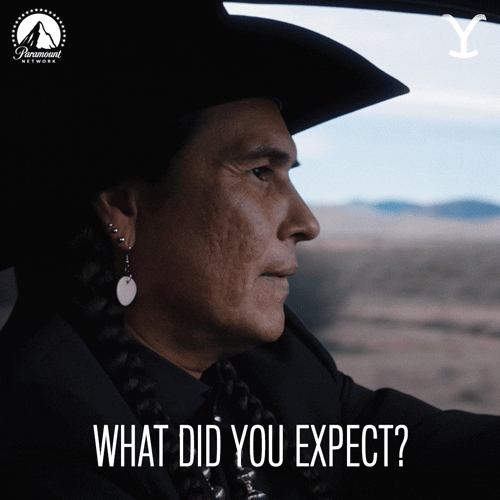
When Johnny Cash performed at Madison Square Garden in December of 1969, they recorded the show and released it in 2002, shortly before his passing.
About halfway through the production, the country/rock legend told a quick story between songs:
It seems like everybody’s concerned about our national problems, about the war in Vietnam, as we all have been.
And they say things like, how do you feel about the Vietnam situation?
I’ll tell you exactly how I feel about it.
Last January we took our entire show, along with my wife June…we went to Long Binh Air Force Base near Saigon…and a reporter friend of mine asked… “that makes you a ‘hawk’ doesn’t it?”
I said no…that don’t make me a hawk…
But I said if you watch the helicopters bring in the wounded boys…then you go into the wards and try to sing for them…and do your best to cheer them up…so they can get back home…it might make you a dove…with claws. -Johnny Cash
For those that don’t know, a “hawk” was someone that supported the war, and obviously, “doves” did not.
But opinions aren’t so easily defined, as Cash illustrated.
After the anecdotal applause, the band progressed into Last Night I Had the Strangest Dream.
Here are the first few lyrics:

Yet while many passive Cash fans might associate “The Man in Black” with mainstream country/rock music, they may not know he was a controversial artist in his heyday.
For example, the Arkansas native often spoke on issues within the criminal justice system and human rights violations.
As an advocate for prison reform, Cash believed many convicts were good people but made poor decisions and that society could never expect released prisoners to act right if we treated them like animals.
That’s why he did the famous Folsom prison show.
In addition, many radio stations refused to play Cash’s 1964 release, Bitter Tears: Johnny Cash Sings Ballads of the American Indian, a concept album about government mistreatment of Native Americans.
But that was probably the point.
The definition of protest is peacefully disrupting the norm to attract attention to a problem.
And there was no shortage of protests during the Vietnam era.
In the 1960s, not only was there a musical revolution, but artists weaponized their tunes to raise public concerns, as Johnny Cash did in New York in 1969.
Large gatherings such as Woodstock or the Monterey Pop Festival attracted like-minded people from around the country, where everyone mostly agreed with each other.
But sometimes, musical activists protested much smaller and more opposing audiences in search of truth and accountability.
An Evening at The White House in 1970

Aside from Folsom prison, one of the unique venues in music history is Johnny Cash’s performance at The White House in 1970.
President Nixon initially invited Cash to perform Merle Haggard’s Okie from Muskogee and Guy Drake’s Welfare Cadillac instead of his favorite Cash classics.
The former request shamed anti-war protesters, and the latter references welfare fraud.
But rather than take offense to Nixon requesting other people’s music or questioning the songs themselves, he told the 37th president they weren’t familiar with those pieces.
More importantly, Cash used the invite as an opportunity to share his thoughts directly with a sitting president and the world.
When showtime came, with sweat beading up on his head, Johnny Cash launched his demonstration.
But by the end of the set, the only one under pressure was Nixon himself.
The Setlist
Here are a few lyrics from the first song for the Nixon administration, titled What is Truth?

Next, they played The Man in Black, which explains Cash’s wardrobe:

To conclude the presidential performance, Cash presented The Ballad of Ira Hayes from the Bitter Tears album I mentioned.
This song is about USMC Corporal Ira Hayes, who helped raise the flag at Iwo Jima only to return home and drink himself to death at age 32.

Johnny Cash could have taken the easy route and played well-known hits like Ring of Fire or Get Rhythm and been done with it, avoiding the political crossfire.
But he didn’t.
He knew music was an effective tool, and he had an obligation to fight for the truth.
Johnny Cash’s musical protests and many others of the time helped society move forward by drawing attention and spreading messages.
Yet today, we have a new set of social issues, but is anyone willing to draw fire as Johnny Cash did?
An Afternoon at The White House in 2022

Famous musicians still perform at the White House but aren’t there to demand answers anymore.
Earlier this month, finger-style acoustic master James Taylor visited DC to help the Biden administration celebrate their “inflation reduction” party.
But while Taylor played his 1970s hit Fire and Rain (an odd selection as it’s a song about suicide), there was some unfortunate timing with breaking economic news.
That’s because that same day, as party-goers popped bottles, the Labor Department Consumer Price Index reported inflation held strong at record levels.
While gas came down some, mostly everything else went up:
Food up 13.5%
Electricity up 15.8%
Rent up 6.8%
Health insurance up 24.3%
In addition, the Dow Jones Industrial Average dropped 4%.
Aside from James Taylor’s performance, pop star Olivia Rodrigo spoke at a White House briefing last year to “urge the importance of vaccinations with young people.”
It doesn't matter if you're young and healthy, getting the vaccine is about protecting yourself, your friends and your family. Let's get vaccinated! -Olivia Rodrigo
Gross.
Fifty years after Johnny Cash’s presidential event, musical artists no longer protest and demand accountability for the truth from our leaders.
Now, stars of yesterday and today serve as establishment shills.
Future of Musical Dissent
So what happened?
How did we go from Johnny Cash protesting directly to the top of government leadership to James Taylor singing about suicide during an inflation reduction party while the rest of us hemorrhage money on everyday expenses?
How did the counter-culture lose its most effective weapon?
It appears greed and vanity got in the way.
If you recall, Neil Young pulled his work from Spotify earlier this year over Joe Rogan’s CV comments.
Young wrote online about Spotify: "They can have Rogan or Young. Not both."
Welp. They chose Rogan.

Other former counter-culture legends such as Stephen Stills, David Crosby, Graham Nash, and Joni Mitchell also requested Spotify remove their music.
It’s crazy that the person who wrote Keep on Rocking the Free World wants to ban free speech.
During the 2020 election, Lady Gaga tried to portray herself as an everyday American, asked people to vote for Biden, and even joined him on the campaign trail.

And it’s not just musicians.
Don’t forget this celebrity montage telling white people to take responsibility for the color of their skin.
The arts used to be a weapon for the counter-culture, a peaceful and effective tool to spread messages across the masses.
Today’s “artists” forgot that.
They’ve been so inundated with money and stardom that they lost touch with everyday people and basic ethics.
To speak out for what’s right would mean they lose out on attention, money, and Hollywood access.
They’re addicted to clicks, likes, nominations, and they dread the social “cancellations” many of them perpetrate.
They would prefer to get a McDonald’s meal named after them or start a clothing line rather than demand accountability.
They aren’t artists anymore.
They’re brands, and their actions are marketing tactics.
And they set the example for incoming stars.
The artists of yesterday fought for change and stuck it to the man.
Yet here we are years later with a new set of problems, and we desperately need someone to follow in Johnny Cash’s footsteps.
Who will use music to ask, what is gender? Or recession? Or racism?
What exactly is the “Ultra MAGA threat to our democracy?”
Someone, please, bring your guitar, microphone, kazoo, or whatever to 1600 Pennsylvania Avenue, and demand, what is truth?



